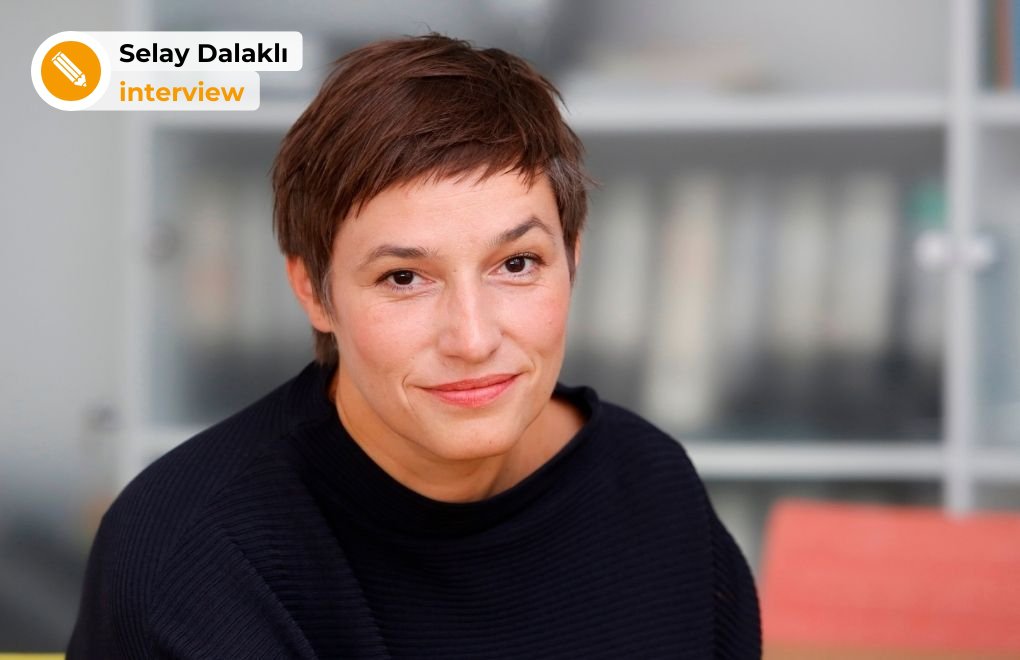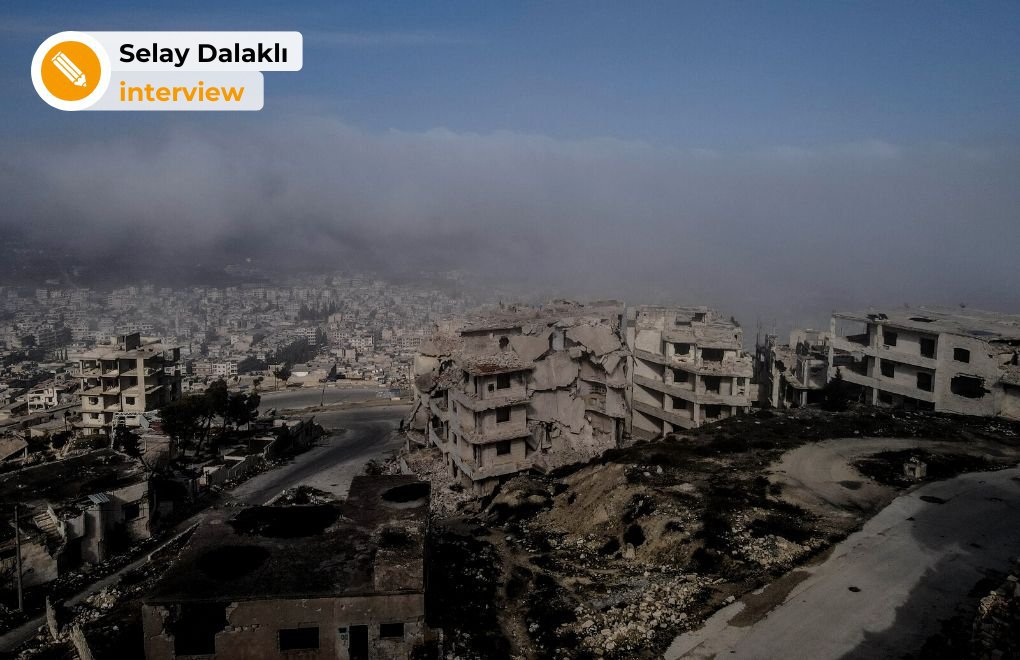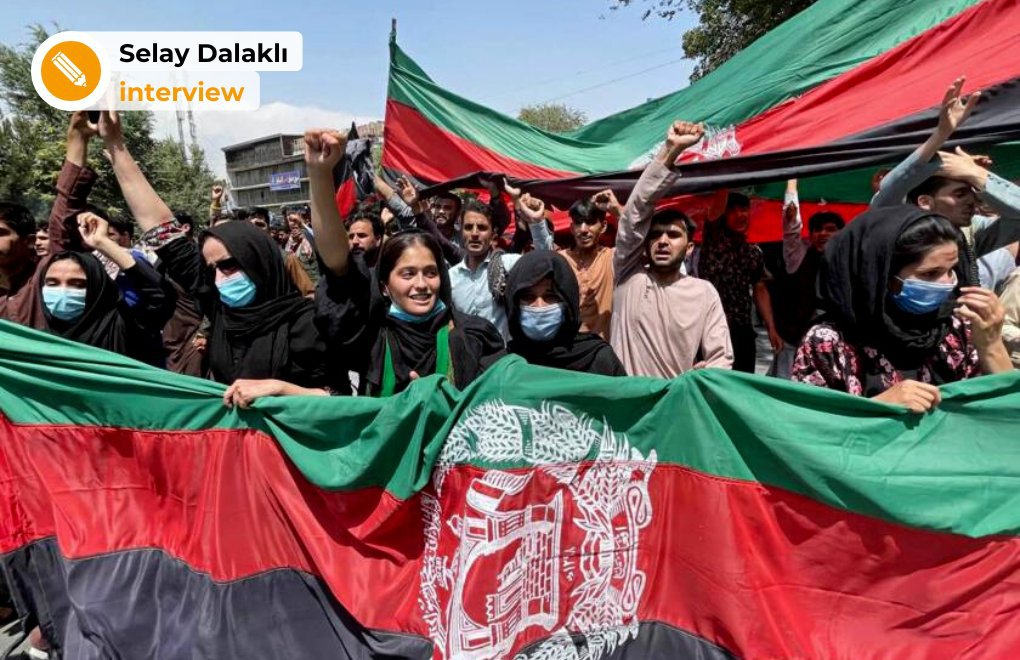MURAT SOMER COMMENTS / 2
‘Turkey is one of the countries resisting autocratization the most’

"Get mad as we resist" (Photo: Evin Arslan / csgorselarsiv.org)
Click to read the article in Turkish
"Turkey is a country which has gone through an enormous amount of incremental democratic erosion and at a certain point, democracy has been suspended in Turkey... But at the same time, Turkey is one of the countries which has resisted incremental autocratization the most."
This is how Prof. Murat Somer from Koç University Department of Political Science and International Relations describes the autocratization that Turkey has suffered in the past decades in the second part of our interview on "creeping authoritarianism" in Turkey and the world.
CLICK - Both familiar and new: Democratic erosion
According to Prof. Somer, democracy is not something that just "happens," like growing up and aging, independently from our willful choices; but rather, democracy is something built, something built with free human will, it is a voluntary choice.
Underlining that the current situation is different from the past, Somer says that it is not enough to be merely alert or brave under the conditions of incremental autocratization that we are going through today:
"One needs to be creative. Creativity is needed. So, one needs to be very strategic. Because the greatest danger of incremental autocratization is that it has a bigger potential of normalizing authoritarianism."
Let's listen to the rest from Prof. Murat Somer himself...
'Suspended' democracy in Turkey
When we consider the elections held in the world over the past year, for instance in Germany, we see that far-right parties and candidates lose votes/elections. Is it possible to see these as some kind of counter-movement against autocratization?
In fact,  we should not look at it on a country-by-country basis. There is a division inside societies as well.
we should not look at it on a country-by-country basis. There is a division inside societies as well.
Let's look at it through Turkey:
On one hand, Turkey is a country which has suffered enormous authoritarianism, democratic erosion and incremental autocratization, in the past 10-15 years and - opinions on dates may differ but - at a certain point, democracy has been suspended in Turkey. (I think "suspended" is the right description but one might as well say collapsed.)
On the other hand, Turkey is one of the countries that has resisted incremental autocratization the most.
So, when you consider half of the society, they have displayed incredible resistance, great objection; they have tried to put a stop to this course of events and to develop different strategies.
We see this when we look at the voting trends as well as election turnouts. We also see this at mass demonstrations. We also see this when we look at the protests and acts of resistance at a micro level as well as the resistance of civil society. We may also talk about what political parties say and do and even the resistance coming from inside the bureaucracy.
Therefore, the side of Turkey that supports this autocratization needs to be considered separately from the one that resists it. In polarized countries like Turkey, there is of course a dialectical relation between the two. So, it goes hand in hand with polarization. It is "a democratic resistance" in the eyes of the one while it is an attack on democracy in the eyes of the other.
Polarization and the case of Chile
Let me add this, too: One of the most important characteristics of this new pattern and model of autocratization is this polarizing politics and polarization. The groups who support authoritarianism create the pole that is democratic and supports democracy. But their mobilization may keep this supporting group alive and mobilize them. Most societies are divided into two. The democratic camp prevails in some countries while the autocratic camp prevails in others.
For instance, there are very important examples of democratization, too, in the contemporary world. The case of Chile is one of them. I think that Chile is a very important example these days. Because Chile is a country that went through a long period of authoritarianism. First, the Pinochet era and then the transition to democracy in the 90s. But this democracy was not a very satisfying one. It was not a satisfying democracy for everyone in terms of what I have mentioned, in terms of socio-economic models and equality, etc.
At last, in 2017, it started to receive a great reaction with a students' movement. Especially against these neoliberal policies... So, a bottom-up movement eliminated the existing political parties. One of the students' leaders originating from there, Gabriel Boric, won the last elections and he has become the prime minister at such a young age as 35. That students' leader has become the prime minister and it has been a very reformist, very democratic movement now aiming to make a very progressive new constitution.
But when you take a closer look at the elections in Chile, you see that almost half of the voters, a very significant part of them, supported the opposite side. I mean, the opponent of the current Prime Minister of Chile was the candidate of the conservative party. They do not say, "Let's become a dictatorship" but the candidate was a person who did not really reject the Pinochet era and who thought that it had good sides to it. So, a significant part of societies may support it, too.
If the new government is able to rebuild democracy in such a way as to solve deep-rooted problems, the election win of the democratic camp will be lasting. Otherwise, authoritarianism may come back.
'The criticism is this: What new do you say?'
Based on all these, we see how much in congruence the developments in Turkey are with those in the world. Because isn't this also the current problem that we have in Turkey? There has been an expectation that the democratic opposition can say and offer new things, going beyond protecting the democratic system (or restoring it in Turkey's case); there has been an expectation that they can say a lot more new things about participatory democracy, the environment, income distribution, socio-economic system, climate change and so on.
Rule of law, democracy, parliamentary system, free and fair elections may not stir enough excitement. Isn't the opposition parties that came together to rebuild democracy (Table of Six) criticized for this, for lacking more comprehensive policies? In fact, the parties say quite right things: The parliamentary system, democracy, rule of law... But the criticism is this: What new do you say in terms of concrete changes that affect people's daily lives and the great problems of our age? Right? We are very much part of the worldl in that sense. The problem that we see in the world is exactly this.
Ukraine war, Russia and China
When we look back in time, what do you think we need to reverse this wave of authoritarianism? May the Russia-Ukraine war be a trigger for a change in that direction? Or, to ask in more general terms, what needs to be done on the collective or international level to reverse this trend? What needs to be done for a more democratic world?
Well, it may as well be said like this: When we especially consider the second wave of democratization, a great catastrophe or collapse may pave the way for democratization (As the saying goes, a good scare is worth more than good advice).WW2 led to the second wave of democratization. But I hope that we will not wait for such a negative experience to overcome the current wave of autocracy.
However, we need to keep this in mind, I find it very important: Democracy is not something that just "happens," like growing up and aging, independently from our willful choices; but rather, democracy is something built, something built with free human will, it is a voluntary choice. It is constructed with free human will. So, we need to keep in mind that regardless of the developments in the world, people may draw very different conclusions from this experience.
For instance, the war in Ukraine... You and I; when we look at the Russia-Ukraine war, we may conclude how important democracy is or what dangers an autocracy poses. Couldn't this disagreement resolved differently if Russia were a democracy and Putin a democratic leader?
But there are also those who come to the exact opposite conclusions. That strong authoritarian leaders are needed to pursue national interest. Moreover, if Russia's President Vladimir Putin had succeeded in Ukraine, which he can still do... We cannot know; this is a war, after all... In such a case, so many people would say, "Look what a powerful man has done. He went into Ukraine to protect national interest and has expanded the borders. We need such a leader. We need a world leader." There may also be people who draw such conclusions.
Furthermore, China has not taken up a very clear position on the side of Russia. Why? Because China is also aware of its interests in the world economy; it is aware how integrated the world economy is. It is trying to come to an agreement with the US as much as possible but it was just last month when the relations between the US and China tensed up. So, - it will not be good for the world - if China chooses to camp with Russia, it will ultimately be a decision to be given by Xi Jinping.
They may as well say, "This is heading towards a cold war; our interests overlap with those of Russia" and come close. Or they may also say, "No matter what, let's just not withdraw from globalization all together and avoid a war despite our problems with the US."
So, human will is in play here and these decisions are impacted by what the public thinks and says, what the people in the world, you and I, think and say.
Is a more democratic world possible?
A choice must be made in favor of democracy and it is never collectively done by 90 or 100 percent of society. There are always those who choose different alternatives, those who think differently. But the majority of the society must make the choice that democracy is better than the other alternatives and that being free is better than not being free after all.
Civil society and the media must be alert; resistance must be put up. But being alert does not suffice against incremental autocratization. In fact, being courageous does not suffice, either.
These were effective in the old type of authoritarianism because it was obvious that it was oppressive and authoritarian. Do you have the courage to stand up against it? Have you got sufficiently organized or not? These were the key questions.
The situation today is different. It is not enough to be merely alert or courageous under the conditions of gradual autocratization that we are going through today. One needs to be creative. Creativity is needed. So, one needs to be very strategic. Because the greatest danger of democratic erosion and in general incremental autocratization is that it has a bigger potential of normalizing authoritarianism.
What about Turkey?
Let me add this as a last word:
In the authoritarianism of the past, these authoritarian regimes used to spend vast amounts of sources to normalize themselves. Propaganda machines, oppression, education... They used to do all these. But today, the fact that autocratization is gradual leads to getting used to.
For instance, if we remember what happened in Turkey last month, remembering for example the unlawfully banned concerts by the government and all, there were some reactions but all hell did not break loose at the end of the day. I mean, if these concerts had been banned in this way 10-15 years ago, we would have talked about this for weeks. It would have been quite an issue. But we have got used to it today.
And what is worse is that it weakens the society and the opposition from inside. Because people start to accuse the opposition more than the government at several points.
About Prof. Murat SomerMurat Somer is a Professor of Political Science and International Relations at Koç University, Istanbul, and an expert on polarization and de-polarization, religious and secular politics, ethnic conflicts, autocratization, and democratization. His recent publications include two special issues on polarization and democracy ("American Behavioral Scientist", 2018, and the "ANNALS of the AAPSS", 2019, both co-edited with Jennifer McCoy), and "Return to Point Zero: The Turkish-Kurdish Question and How Politics and Ideas (Re)Make Empires, Nations and States" (SUNY Press, forthcoming in June 2022). |
(SD)
PROF. DEITELHOFF COMMENTS
How close are we to peace in the Russia-Ukraine war?

Aron Lund comments: What is next with Türkiye-Syria relations?

Foreign Policy of Türkiye in light of what 2022 brought

How did media report 2021 forest fires in Türkiye?
.jpg)
ZAHRA NADER TELLS / 2
‘Feminist movements all around the world should solidarize with Afghanistan’






